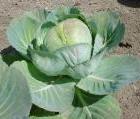












































 Polish scientists are investigating unusual properties of cabbage
Polish scientists are investigating unusual properties of cabbageCabbage is beneficial not only to hair, nails and skin, but also to soil and plants. Polish scientists are investigating the impact of growing sprouts on decreased soil contamination with heavy metals and how the cabbage juice can be used to protect plants, reported the press office of the Gdansk University of Technology.
According to the Gdansk University of Technology press office, it appears that the natural properties of the cabbage allow to reclaim the ground for another crop or to prepare it for organic production cheaply and in a relatively short time.
"Cabbage has an amazing ability to collect pollutants, large amounts of heavy metals, but also harmful organic compounds of industrial origin - explained Dr. Eng. Piotr Konieczka from the Department of Analytical Chemistry, Gdansk University of Technology. - It is characterized by a significant increase in biomass in a relatively small volume of the head." It means that cabbage takes a lot of water and substances dissolved in it while occupying small areas of arable land.
But this does not exhaust possible uses of cabbage. Plants grown in the contaminated area can be advantageously used, for example in the manufacture of preparations to protect crops.
The plant can be used as a natural biopesticide. It contains many sulfur and nitrogen compounds that are essential for plant growth, as they offer protection against pests and feed plants - said Dr. Eng. Agnieszka Bartoszek, assistant professor in the Department of Chemistry, Food Technology and Biotechnology, Gdansk University of Technology. "Moreover, [cabbage] contains phytochelatins binding heavy metal ions, which means that the cultivation of the soil enriched with our biopreparation prevents plants from taking harmful metals from the soil" - added the researcher.
"We have a good prospects – with natural crop protection product formulation the crops are nourished, protected against the toxic metals present in the soil, and also against pests - parasites, bacteria, fungi" - concluded Agnieszka Bartoszek.
She mentioned that initially the research focused on the properties of cabbage beneficial to health and on how growing conditions affect the production of bioactive compounds in cabbage.
"We knew from the literature that the cabbage that grew on a very dirty soil had excellent biological activity. Chemical stress in cabbage plants causes increased synthesis of bioactive substances. Our tests confirmed the results obtained in other research centres" - said Bartoszek.
The study conducted at Gdansk University of Technology showed that the accumulation of heavy metals in cabbage can be linked to the plant’s increased biological activity. Hence the idea for the project dedicated to environmental protection. Activities have been included in the project AGROBIOKAP as preliminary tasks.
Using only cabbage for soil treatment, however, might prove cost ineffective. Cabbage in 80 consists of water, so the reclamation with its use would produce much waste that would be hard to recycle - explained Dr. Barbara Kusznierewicz, assistant professor in the Department of Chemistry, Food Technology and Biotechnology, Gdansk University of Technology. "But want to use the cabbage juice. Harmful substances accumulate in pomace, on the utilization of which another sub-team of the Department of Chemical Technology in our faculty is already working" - said Dr. Kusznierewicz.
Scientists are now one third into the project, which is scheduled to end in June 2013.
From: PAP